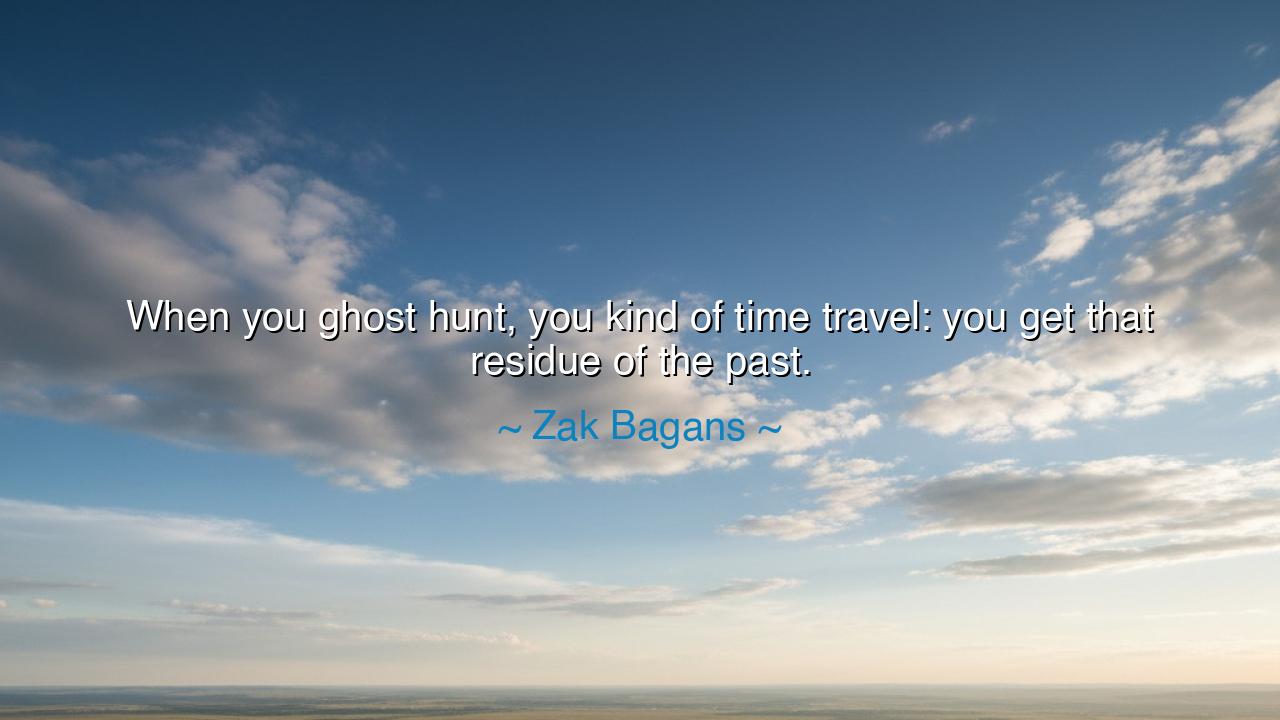
When you ghost hunt, you kind of time travel: you get that






When Zak Bagans declared, “When you ghost hunt, you kind of time travel: you get that residue of the past,” he revealed a truth deeper than the spectacle of haunted houses or whispers in the dark. His words speak of memory, of the lingering energy of those who came before us, and of the strange communion between the living and the dead. To seek spirits is, in his vision, to stand in the doorway of time itself, to brush against echoes that refuse to fade.
The meaning is clear: to engage with the unseen is to step beyond the present moment, into a place where yesterday is not gone but still alive in fragments. The ghost hunt is not simply a search for apparitions—it is a recognition that the past never fully disappears. It leaves behind impressions, shadows, residue—moments frozen in the air and in the walls, waiting for those sensitive enough to notice. In this way, Bagans likens ghost hunting to time travel, for it allows the seeker to walk, however briefly, into a realm where centuries collapse and the present mingles with what once was.
History offers parallels to this idea. Consider the ruins of Pompeii, buried by ash yet perfectly preserving the final day of its people. To walk its silent streets is not unlike what Bagans describes—you breathe the residue of the past, seeing the loaves of bread left in ovens, the murals on walls, the frozen gestures of lives suddenly halted. Though no ghosts appear, the feeling is the same: time folds, and the ancient world whispers through stone and silence. In this sense, all great sites of memory are haunted, not only by spirits but by the weight of human presence that refuses erasure.
Even the ancients spoke of such lingering energy. The Greeks told tales of shades in Hades who could be summoned by libations and rites, remnants of lives that once burned bright. The Romans built shrines to their lares and penates, household spirits who were thought to guard the living even after death. What Bagans calls residue, they called essence, the spark that lingers after the flame has gone out. Thus his words are not new, but an echo of wisdom carried through millennia—that the past never leaves us entirely, but walks beside us in forms both visible and unseen.
Yet there is also a warning hidden in this thought. To seek the past too intently is to risk being ensnared by it. Just as one may learn from ruins or spirits, one may also be trapped in mourning or obsession. The ghost hunt, in metaphor, teaches us that memory must be honored but not idolized. The traveler who gazes too long into what is gone may forget to live in what still remains. Time travel is a gift for moments, not a dwelling place for the soul.
So, dear listener, the lesson is this: be mindful of the residues that surround you. In old houses, in family heirlooms, in the stories of elders, you touch the echoes of lives once lived. Approach them with reverence, for they are reminders that nothing truly vanishes, and that your own life will one day leave traces for others to find. To live is to create future hauntings—memories, stories, and legacies that will echo long after you are gone.
In practical action, this means: honor the past without being bound by it. Visit places of memory and history, listen to the voices of ancestors, and learn their lessons. If you seek the unseen, do so not with fear, but with respect for the endurance of the human spirit. And as you live, act with the knowledge that you, too, are leaving residues—the words you speak, the kindness you show, the harm you avoid—all of these will become part of the fabric of time.
Thus Zak Bagans’ words, though born of ghost hunting, strike deeper than superstition. “When you ghost hunt, you kind of time travel: you get that residue of the past.” To remember this is to walk humbly through life, aware that every moment is layered upon the countless moments before it, and that to touch the past is to glimpse eternity.






AAdministratorAdministrator
Welcome, honored guests. Please leave a comment, we will respond soon